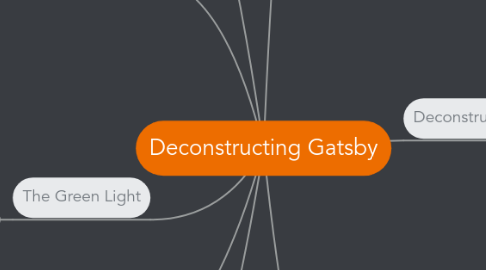
1. Dust
1.1. Page 2: "...it is what preyed on Gatsby, what foul dust floated in the wake of his dreams that temporarily closed out my interest in the abortive sorrows and short-winded elations of men."
1.2. Page 180: "That fellow had it coming to him. He threw dust into your eyes just like he did in Daisy's..."
1.3. "But above the grey land and the spasms of bleak dust which drift endlessly over it..."
1.4. The "dust" is symbolic of poverty and falsehood. Gatsby lies about his past of small beginnings, blinding Daisy and Nick. What made Gatsby feel guilty fascinated the others.
2. The Green Light
2.1. Most people interpret the green light to symbolize Gatsby's hopes of getting back with Daisy.
2.1.1. However, green can be symbolic of envy and money.
2.1.1.1. In this light, Gatsby does not want Daisy because she's the love of his life, but for superficial reasons (as envy and money are). This is also displayed in the ways that Gatsby tries to romance her and the person that Daisy is-- superficial love for a superficial pair.
2.1.1.2. He describes her voice as "full of money"
3. Sources
3.1. Appleman, Deborah. Critical Encounters in High School English: Teaching Literary Theory to Adolescents. Second ed. New York: Teachers College, 2000. Print.
3.2. Dennis, Deborah, and Charlene C. Trotman. Deconstruction Literary Theory and a Creative Reading of "The Great Gatsby" N.p.: n.p., 1991. 26 Nov. 1991. Web. 11 Dec. 2014. <chrome-extension://ecnphlgnajanjnkcmbpancdjoidceilk/http://files.eric.ed.gov/fulltext/ED351684.pdf>.
4. Nick's Hypocrisy
4.1. Page 179: "I thought you were rather an honest, straight-forward person. I thought it was your secret pride."
4.2. "I'm five years too old to lie to myself and call it honor."
4.3. Page 1: "In consequence, I'm inclined to reserve all judgments..."
4.4. "They're a rotten crowd... You're worth the whole damn bunch put together."
4.4.1. "I"ve always been glad I said that. It was the only compliment I ever gave him, because I disapproved of him from beginning to end."
4.5. Frowns upon the immorality of his friends, yet helps facilitate a meeting between Daisy and Gatsby, in a sense helping destroy Tom and Daisy's marriage.
5. Nostalgia
5.1. Gatsby knocks over the clock in Nick's house, symbolizing "the clumsiness of his attempt to stop time and retrieve the past".
5.2. "We are beat back ceaselessly into the past
5.3. Gatsby and Daisy are both childlike
5.3.1. Gatsby tries to win Daisy's love with such juvenile strategies as bribing her associates (Nick), showing off,
5.3.2. Night before her wedding, Daisy is found hopelessly drunk and calling off the wedding; had to get friends to clean her act up.
5.3.3. Her middle name is Fay; faeries are usually seen as from children's imaginations.
5.3.4. Can't choose between Gatsby and Tom; children are fickle.
6. Foils
6.1. Daisy (Fay) & Myrtle
6.1.1. both named after flowers
6.1.1.1. Daisies: symbolize innocence, Fay: another word for fairy; the character was "mythical", as you could say, for she was a liar. She was, however, far from innocent-- she even killed Myrtle later on in the book, and let Gatsby take the fall for it; she was a cynic; racist; brags about her child, but takes no part in raising her.
6.1.1.2. Myrtles: good luck in marriage; the character was Tom's mistress and caused stress in his marriage.
6.1.1.3. Daisy and Myrtle were both some of the most popular names in the 1920s according to the Official Social Security Website, leading us to wonder if this symbolic irony was intentional or not.
6.1.2. both in a relationship with Tom
6.1.2.1. Daisy annoys Tom on page 12: "I hate that word hulking," object Tom crossly, "even in kidding." "Hulking," insisted Daisy.
6.1.2.2. Yet when Myrtle does the same in the next chapter: "Daisy! Daisy! Daisy!" shouted Mrs. Wilson. "l'll say it whenever I want to! Daisy! Dai--" Making a short deft movement, Tom Buchanan broke her nose with his open hand."
6.1.3. Catherine (in reference to Tom and Myrtle: "Neither of them can stand the person they're married to."
7. Binaries
7.1. The East and the West
7.1.1. East Egg is for the more sophisticated, born-and-raised rich people. West is the nouveau riche.
7.1.2. Tom says he'd be a "fool to live anywhere" but the East (Pg. 10)
7.1.3. Page 36, at Myrtle's apartment: "I wanted to get out and walk eastward toward the park through the soft twilight..."
7.1.4. Nick moves eastward in hopes of a better life.
7.1.5. ...but still only ends up in a bungalow on the lowlier West Egg (couldn't achieve the wealth and class he aimed for).
7.1.6. "Nick" means "victory", from Greek.
8. Deconstructionism
8.1. Meaning is made by binary oppositions, but one item is unavoidably favored over the other.
8.2. This hierarchy may be unintentional, and can be rearranged/reversed once exposed. If it's intentional, it will only make sense for so long before it falls apart.
8.3. Everything can be called into question life is not black and white, there is no binary. There will be gaps, spaces, and contradictions that "defeat closure and determinate meaning".
8.4. "All reading is misreading."
8.5. Strategies
8.5.1. Detect the oppositions in the text. Identify which party is favored, and then find contradictionsof that privilege.
8.5.2. Determine what seems to be "central to the text" and what the author tried to leave out or avoid.
8.5.3. "Expose the text's indeterminacy." Assume that if you look closely enough, everything will make no sense.

